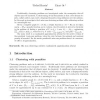Free Online Productivity Tools
i2Speak
i2Symbol
i2OCR
iTex2Img
iWeb2Print
iWeb2Shot
i2Type
iPdf2Split
iPdf2Merge
i2Bopomofo
i2Arabic
i2Style
i2Image
i2PDF
iLatex2Rtf
Sci2ools
104
click to vote
EOR
2010
2010
Min sum clustering with penalties
Traditionally, clustering problems are investigated under the assumption that all objects must be clustered. A shortcoming of this formulation is that a few distant objects, called outliers, may exert a disproportionately strong influence over the solution. In this work we investigate the k-min-sum clustering problem while addressing outliers in a meaningful way. Given a complete graph G = (V, E), a weight function w : E IN0 on its edges, and p IN0 a penalty function on its vertices, the penalized k-min-sum problem is the problem of finding a partition of V to k + 1 sets, S1, . . . , Sk+1, minimizing k i=1 w(Si) + p(Sk+1), where for S V w(S) = e={i,j}S we, and p(S) = iS pi. Our main result is a randomized approximation scheme for the metric version of the penalized 1-min-sum problem, when the ratio between the minimal and maximal penalty is bounded. For the metric penalized k-min-sum problem where k is a constant, we offer a 2-approximation.
| Added | 10 Dec 2010 |
| Updated | 10 Dec 2010 |
| Type | Journal |
| Year | 2010 |
| Where | EOR |
| Authors | Refael Hassin, Einat Or |
Comments (0)

